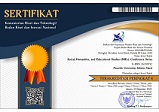Membangun Keterampilan Berpikir: Potensi Guru Sejarah dalam Mempromosikan Literasi Kritis
Abstract
The learning strategy applied by the history teacher basically affects the process and learning outcomes of students. Moreover, in the 21st century, various challenges arise so that the concept of 21st century education is needed to face these challenges. One of the efforts that history teachers can do in facing the challenges of 21st century education is to promote critical literacy. This article is a theoretical study written using the literature study method. The purpose of writing this article is to try to embody the two discussions. First, provision of critical literacy for prospective history teachers. Second, the strategy of history teachers in promoting critical literacy to students. Based on the results of the study of literature, it can be concluded that history teachers basically have the potential to promote critical literacy to students through the concept of historical thinking skills and controversial historical discourses. Considering that, in the education process at the tertiary level, prospective history teachers are very familiar with critical literacy so that they have the opportunity to transmit the implementation of critical literacy to students in secondary schools.
Keywords
Full Text:
PDFReferences
Ahmad, T.A. 2016. Sejarah Kontroversial di Indonesia: Persoektif Pendidikan. Jakarta: Yayasan Obor Indonesia
E. Mulyasa. 2007. Menjadi Guru Profesional. Bandung: PT. Remaja Rosdakarya
Kochhar, S.K. 2008. Pembelajaran Sejarah. Penerjemah H. Purwanta dan Yofita Hardiwati. Jakarta: Grasindo
P21 (Partnership for 21st Century Learning) http://www.battelleforkids.org/networks/p21 diakses 14 Desember 2021
Permendikbud Republik Indonesia No. 87 Tahun 2013 https://luk.staff.ugm.ac.id/atur/Permendikbud87-2013PendidikanProfesiGuru.pdf diakses 16 Desember 2021
Seixas, P. 2015. A Model of Historical Thinking. Educational Philosphy and Theory, 49 (6) 593-606
Septanto, H. 2018. Pengaruh HOAX dan Ujaran Kebencian Sebuah Cyber Crime Dengan Teknologi Sederhana di Kehidupan Sosial Masyarakat. Kalbiscentia: Jurnal Sains dan Teknologi, 5 (2) 157-162
Symcox, L. 2002. Whose History?: The struggle for national Standard in American Classrooms. New York &London: Teachers Colege Columbia University
Undang-Undang Republik Indonesia Nomor 14 Tahun 2005 Tentang Guru dan Dosen. https://ppg.kemdikbud.go.id/download/undang-undang-republik-indonesia-nomor-14-tahun-2005-tentang-guru-dan-dosen/ diakses 14 Desember 2021
Wagner, T. 2010. The Global Avheivement Gap: Why Even Our Best Schools Don't Teach the New Survival Skills Our Children Need and What We Can Do About It. New York: Basic Books.
Wisudo,B. 2011. Literasi Kritis, Alternatif Melawan Pendangkalan Pembelajaran Di Sekolah. H.A.R Tilaar, Jimmy Ph. Paat, Lody Paat. Pedagogik Kritis: Perkembangan, Substansi, Dan Perkembangannya di Indonesia. Rineka Cipta: Jakarta
Zed, M. 2018. Tentang Konsep Berpikir Sejarah. Lensa Budaya, 13 (1) 54-60
Refbacks
- There are currently no refbacks.





